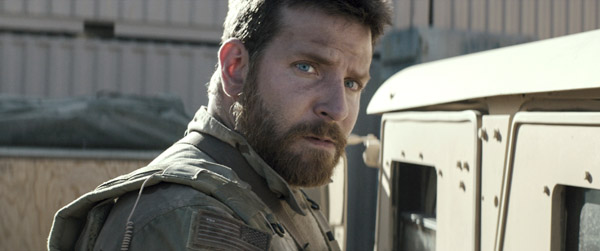At more than one point, in three scenes that I could count, Bradley Cooper’s Chris Kyle is in the thick of fighting in Iraq when he gives or receives a phone call to or from his pregnant wife, Taya (Sienna Miller), back in the States. She tells him the baby’s a boy. Such joy, but then right at that moment comes the BOOM of the war zone, as his wife, still on the phone, listens to the chaos in the background.
This isn’t the same situation for all the phone calls—and, to be sure, I can’t remember another war movie (though maybe this is the first war) where a soldier can talk to his wife via cell phone while in the midst of killing people. It still comes across as a foreshadowing cliché that has been seen before. Or at least that’s how it feels.
However, director Clint Eastwood doesn’t always dip into such tropes when telling this biopic of SEAL sniper Chris Kyle, who had 160 confirmed kills in Iraq. Nor does he exactly take a side as to whether the war was right or wrong. The movie isn’t about that. It’s about a particular soldier, someone who is raised to believe wholeheartedly, without a bit of cynicism, in the American dream, though he doesn’t have a lot to live for before joining up with the SEALS after seeing a bombed U.S. Embassy on TV. (Kyle was an aimless Texas cowboy as seen early on.) He ultimately did four tours of duty in Iraq while having a wife and growing family at home.
Cooper is the star here, and if there’s any major reason to see this, it’s for him. He communicates a lot through restraint. Cooper portrays Kyle as a man of strong reserve and determination, but with a lot of pain bottled up. Kyle, as seen in the film, has post-traumatic stress disorder from his tours of combat, and Cooper gets to the nature of someone who’s functional but at the same time a time bomb that can go off at any minute.
It’s not the scenes where he breaks down and cries or blows up at in anger that impresses the most (though he shows his depth here as well), but when he listens to other soldiers. Then he becomes the Strong Alpha Male that he’s been raised to be and has to live up to every day. Most remarkable is when he is back home in-between tours. Another soldier recognizes him at a car shop, approaches him, and thanks him for saving his life, and Kyle just doesn’t know what to do or say. The way Cooper plays it is brilliant.
Eastwood is old school, so he doesn’t go into that shaky camera, rapid-fire editing BS. You can tell what’s going on in the rooftop shoot-outs, and there’s an effective, dizzying sequence in the last third involving a sandstorm that is one of the highlights. Yet it’s kind of a shame then that with such a strong performance and riveting action set pieces that there are some story devices that just pop up from time to time.
When you have a murderous adversary and supposed Syrian Olympic medalist, the sniper Mustafa (Sammy Sheik), made to be “the guy” to lure Kyle back again and again to Iraq, the film feels familiar, almost making it closer to a video game in which Kyle has an opponent to take out. Certainly how this climaxes, in a particular slow-motion shot, is an example of Eastwood falling back on something easy.
American Sniper honors soldiers, making that the focus over whether it was right or wrong to go into Iraq in the first place (and, for the record, Eastwood was against the war). When he focuses on Kyle’s trauma, those brief scenes where he breaks down and can’t function and yet has trouble seeking help really stick out as moving and harrowing. The war at home and the war in the mind are as powerful, if not more in the long run, than the battles and chaos.

















Leave A Comment